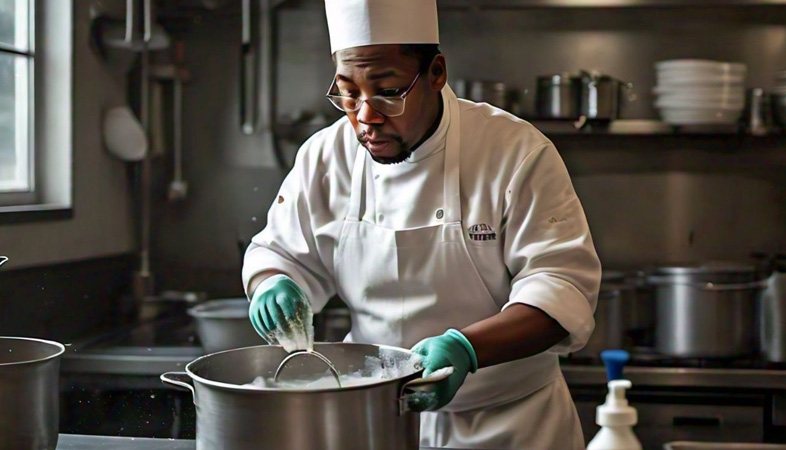Training Excellence: Developing a Top-Notch Kitchen Stewarding Team
The foundation of an effective kitchen stewarding training program begins with a clear understanding of the team’s responsibilities.
In the bustling environment of a commercial kitchen, the
role of the kitchen stewarding team is pivotal to maintaining cleanliness,
organization, and overall efficiency. Developing a top-notch kitchen stewarding
team requires a strategic approach to training that emphasizes skill
development, effective communication, and a commitment to excellence. By
investing in comprehensive training programs, restaurants and foodservice
operations can ensure that their kitchen stewards are equipped to meet high
standards and contribute to the success of the kitchen.
The foundation of an effective kitchen stewarding training program begins with a clear understanding of the team’s responsibilities. Kitchen stewards are responsible for maintaining the cleanliness of kitchen equipment, utensils, and work areas, ensuring that hygiene standards are met and that the kitchen operates smoothly. Training should cover essential tasks such as dishwashing, sanitation practices, waste management, and equipment maintenance. Providing a detailed overview of these responsibilities helps set clear expectations and prepares team members for their roles.
Hands-on training is crucial for developing practical skills and building confidence. Kitchen stewards should receive instruction in the proper use of cleaning chemicals and equipment, including dishwashers, scrubbers, and sanitizers. Demonstrations and supervised practice sessions allow trainees to learn the correct techniques and understand the importance of thorough cleaning. Emphasizing safety procedures, such as handling chemicals responsibly and avoiding cross-contamination, is also essential to ensure a safe and hygienic work environment.
Effective communication and teamwork are key components of a successful kitchen stewarding team. Training programs should include modules on communication skills, conflict resolution, and collaboration. Kitchen stewards often work closely with chefs and other kitchen staff, so fostering positive working relationships and clear communication channels is vital. Role-playing scenarios and team-building exercises can help trainees develop these skills and learn how to address challenges effectively.
Continuous learning and development are important for maintaining high standards and adapting to new techniques and technologies. Training programs should incorporate opportunities for ongoing education, such as workshops, seminars, and certifications. Encouraging kitchen stewards to stay updated on industry trends and best practices helps ensure that they remain knowledgeable and skilled in their roles. Providing access to resources and encouraging a culture of continuous improvement can also contribute to long-term success.
A strong focus on hygiene and safety is fundamental to training excellence in kitchen stewarding. Kitchen stewards should be trained in proper sanitation protocols, including handwashing techniques, proper food storage, and cleaning schedules. Understanding the significance of food safety and hygiene standards is crucial for preventing contamination and maintaining a clean and safe kitchen environment. Regular audits and inspections can help reinforce these practices and ensure compliance with health regulations.
Leadership and mentoring play a significant role in developing a top-notch kitchen stewarding team. Experienced team members and supervisors should take an active role in mentoring and guiding new trainees. Providing constructive feedback, recognizing achievements, and offering support can help build confidence and encourage professional growth. A positive and supportive work environment fosters a sense of pride and motivation among kitchen stewards, contributing to their overall performance and job satisfaction.
Evaluating the effectiveness of training programs is essential for ensuring that they meet the desired objectives and yield positive results. Regular assessments and performance reviews can help identify areas for improvement and determine whether additional training is needed. Soliciting feedback from kitchen stewards about their training experiences and incorporating their suggestions can also help refine and enhance training programs.
In addition to formal training, creating opportunities for hands-on experience and practical application is crucial. Allowing kitchen stewards to take on real-life tasks and responsibilities under supervision helps solidify their learning and build their competence. Providing a structured onboarding process that gradually introduces trainees to various aspects of the role ensures a smooth transition and helps them feel confident in their abilities.
Developing a top-notch kitchen stewarding team involves a comprehensive approach to training that emphasizes skill development, effective communication, hygiene and safety, continuous learning, and leadership. By investing in thorough training programs and fostering a positive work environment, restaurants and foodservice operations can build a skilled and efficient kitchen stewarding team that contributes to the overall success of the kitchen. A commitment to training excellence ensures that kitchen stewards are well-prepared to meet high standards, maintain cleanliness, and support the smooth operation of the kitchen.
.png)




























